#The Autobiography of Special Agent Dale Cooper: My Life In Tapes
Text





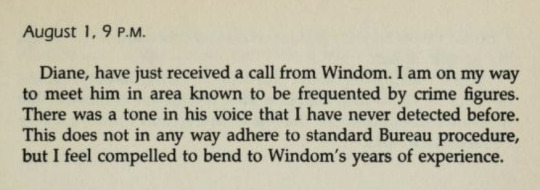
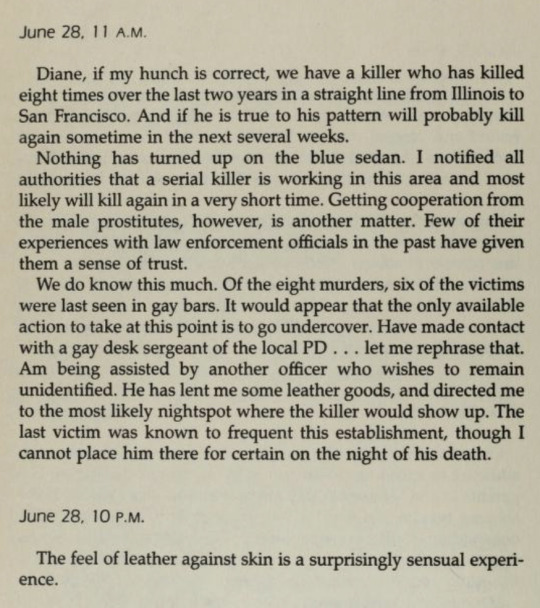
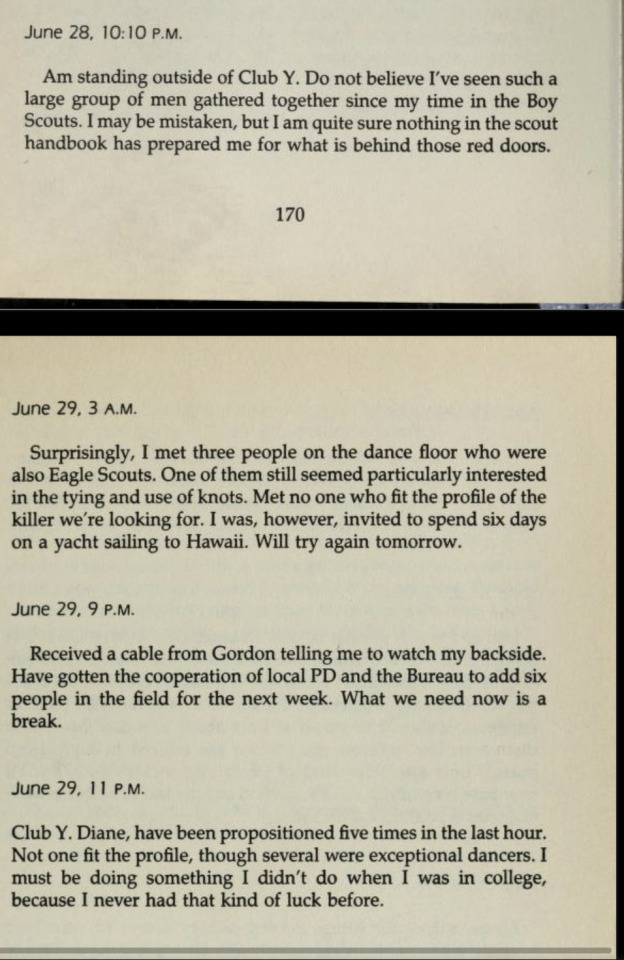
Some gems from the Autobiography of Special Agent Dale Cooper: my life in tapes
#Twin Peaks#Dale Cooper#The Autobiography of Special Agent Dale Cooper: My Life In Tapes#Dale Cooper woulda thrives on tumblr I think#Dale Cooper is gay as a maypole#he uses the most gay wording “I’m getting really good at behind thrown against the wall” fuckin bottom bitch#also there was a scene where he was running a ”is too much of a good thing really bad?” experiment in college#In which he had sex with a girl over and over for a whole day and/or night (it wasn’t clear)#and he talks about her pulling out something from her back which we’re left to assume is a sex toy and then he tells us#that he’s may be too sore to check out#so I’m pretty sure they’re implying Dale Cooper got pegged in college#and he enjoyed it#so have fun with that freaks#also the leather shit#if y’all are into writing twin peaks smut Dale Cooper talks about sex all the time in this
278 notes
·
View notes
Text
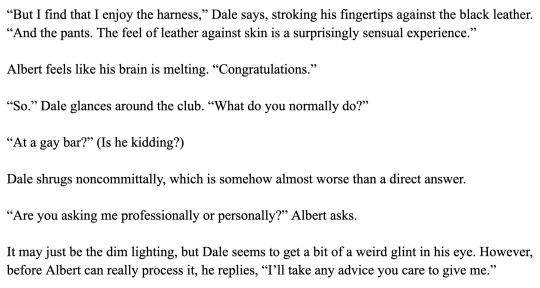
you know how it's established in the autobiography of FBI special agent dale cooper: my life, my tapes that he went undercover at a gay bar that time? what if albert happens to run into him there? (in other words i'm now in twin peaks fic mode don't text)
#maybe i'll actually finish a fic for once! we'll certainly see!#unfortunately these two do haunt me#twin peaks#dale cooper#albert rosenfield#albert x dale#rosendale#fanfiction
228 notes
·
View notes
Text
I’ve found a website where I can read The Autobiography of F.B.I. Special Agent Dale Cooper: My Life, My Tapes. I’m already weeping. My boy.
This is me, Dale Cooper, age thirteen, currently residing at 1127 Hillcrest Avenue, Philadelphia, Pennsylvania. It is a green house with yellow aluminum awnings that Dad bought from Sears to keep the fabric on the couch from fading. I am at present five feet three inches tall, have dark hair, can high jump four feet six inches. Expect at any moment I will begin a growth spurt that will take me to my ideal height of six feet.
73 notes
·
View notes
Text
February 4, 11 A.M.
Diane, what do you know about a special agent named Albert Rosenfelt, and why is he so angry?
the autobiography of fbi special agent dale cooper: my tapes, my life as heard by scott frost
31 notes
·
View notes
Text
Twin Peaks Extended Media
Whether it is for the lack of knowledge in mainstream Twin Peaks spaces regarding them or how some of these things are hard to get, the extended media of Twin Peaks but especially the books are constantly overlooked and ignored for various reasons.
I had done an (incomplete) index of it that blew up in my original account, and I had redone it (but as a more extensive guide that also included the order to watch the show). However, I changed my mind and decided to redo it, since the third time's a charm, right?
Most of these things include spoilers of the three seasons and the movie, so watch and read at your own risk.
AUDIOBOOKS AND COOPER'S TWIN PEAKS TAPES
The audiobooks consist of Laura's diary, the last two books narrated by cast members of the show, while Cooper's tapes were done by Kyle MacLachlan around the time the show was created, and (believe it or not) earned him a Grammy nomination for it.
Laura Palmer’s Diary (narrated by Sheryl Lee).
Diane: The Twin Peaks Tapes by Agent Cooper (narrated by Kyle MacLachlan).
The Secret History of Twin Peaks (narrated by Mark Frost, Len Cariou, Michael Horse, Mat Hostetler, Amy Shiels, Chris Mulkey, David Patrick Kelly, Robert Knepper, Kyle MacLachlan and James Morrison).
The Final Dossier (narrated by Annie Wersching).
BOOKS AND TEXT
Possibly the most overlooked section in Twin Peaks media. Mostly because some fanboys wrongfully think that because David Lynch didn't write them, it doesn't add to the story and canon, which is a wrong thing to say since these books were written by people involved in the show. Especifically, the writers wrote them and were given notes by Frost and Lynch.
The Secret History and The Final Dossier contain spoilers for the three seasons, so read them at your own discretion.
(*) Laura's diary and Cooper's autobiography are the only texts available in Glastonberry Grove. My recommendation is to copy the text and paste it on a google document, since the PDF has the pages ordered in a way you can later print it and build the book on your own.
The Secret Diary of Laura Palmer (written by Jennifer Lynch)*: Laura's diary is written on the day of her 12th birthday, and ends on February the 23rd, 1989. The book (like Cooper's) is very graphic since Laura has to constantly face BOB in her dreams and in real life, and struggles with how others perceive her as well as harm herself in order to avoid BOB hurting the ones she loves. It does not include the missing pages of her diary.
Internet Archive Link
Glastonberry Grove PDF + Text
Twin Peaks: Access Guide to The Town (by Gregg Almquist, Tricia Brock, Robert Engels, Lise Friedman and Harley Peyton with David Lynch, Mark Frost and Richard Saul Wurman): It's the hardest book to get from the books that were released in the nineties. The Access Guide is somewhat of a predecessor of The Secret History, since it includes some of the origins of Twin Peaks. However, the Access Guide also includes newspaper articles, a donuts recipe, and more fun stuff!
Link of the PDF (It won't show a preview because of how heavy the document is, so simply download it)
The Autobiography of Special Agent Dale Cooper: My Life, My Tapes (written by Scott Frost)*: Cooper's autobiography starts in 1967 and ends on February the 24th, 1989. It featured short interviews from Cooper's friends and other people connected to him and transcripts from his tapes. Like Laura's, Cooper experiences tons of horrifying and sad things, from sexual abuse to murder so reader discretion is advised.
Internet Archive Link
Glastonberry Grove PDF + Text
The Secret History of Twin Peaks (written by Mark Frost): A dossier of Garland Briggs that narrates the history of the town as well as the families that ahve stayed there, alongside relationships in the FBI, it includes letters, menus, classified FBI documents, drawings, fragments of books with notes done by Agent Tamara "Tammy" Preston.
Internet Archive link
The Final Dossier (written by Mark Frost): After the events of The Return, Gordon Cole assigns to Tammy the mission to interview people that were missing in The Return (Annie, Audrey, Donna, Harry, etc).
Internet Archive link
Star Pics Cards: A limited edition series of cards done by the writers of the show including the information of most of the characters, items and spaces featured on the first two seasons (With the exception of Denise Bryson).
Glastonberry Grove index
The Music of Twin Peaks introduction: A small text that came with the album "The Music of Twin Peaks", released in 1990.
Glastonberry Grove link
Twin Peaks scripts: The scripts and transcripts for the first two seasons as well as other texts.
Glastonberry Grove text index
MISCELLANEOUS
Blue Velvet (dir. David Lynch, 1986): Some could say this is the predecessor of Twin Peaks, considering Jeffrey Beaumont (Kyle MacLachlan), Sandy Williams (Laura Dern) and Frank Booth (Dennis Hopper) are considered prototypes for Cooper, Diane and BOB by Dern, Lynch and MacLachlan.
Set in a 50s ambiented town in North Carolina in 1984, Blue Velvet is about a 21 year old college dropout named Jeffrey Beaumont who finds an ear on his way home after visiting his hospitalized father. The movie includes three, very graphic scenes, so watch it at your own risk.
Blue Velvet trailer
Internet Archive link
Mulholland Drive (dir. David Lynch, 2001): Originally going to be an Audrey Horne spin-off for TV, Mulholland Drive is considered to be one of the best films done in history and the best of David Lynch's filmography by many alongside Blue Velvet, Fire Walk With Me and Lost Highway.
After Rita (Laura Harring) survives a car accident on Mulholland Drive but suffers mass amnesia, she meets a up-and-coming star Diane (Naomi Watts) who's deeply intrigued about Rita's past, and together, try to solve the mystery of her past.
Mulholland Drive Trailer
Wrapped in Plastic Magazine: Released for the first time in October of 1992, Wrapped in Plastic Magazine is the most recognizable out of the Twin Peaks related magazines that exist since the start of the show. The issues include essays, theories and even interviews to the stars as well as issues dedicated to other shows and movies like The X-Files!
MUSIC
Music is also one of the most important things in the show (and also one of the best things), as it sets the mood and the personality of each character without having to say anything.
In Glastonberry Grove, you can find the music notations of Angelo Badalamenti for Laura’s theme, the music from the intro (also known as the Falling instrumental), Into The Night, Falling, Dance of the Dream Man, Audrey’s Dance and more.
Floating Into The Night (All of the songs but Mysteries of Love, I Float Alone, The Swan, Floating and I Remember are featured in the show) by Julee Cruise.
The first season Soundtrack by Angelo Badalamenti
The second season Soundtrack by Angelo Badalamenti (including unreleased tracks!).
The Double R Jukebox playlist I made taken from the Access Guide! It features most of the songs but since some of them aren’t on Spotify, you can also find it here.
The Fire Walk With Me Soundtrack by Angelo Badalamenti, Julee Cruise and David Lynch.
The Return Soundtrack that features bands like Chromatics to singers like Rebekah del Rio and Eddie Vedder, as well as Julee Cruise and Angelo Badalamenti, of course.
PHOTOS, BEHIND THE SCENES AND DELETED SCENES
A Slice of Lynch: David Lynch interviews Kyle Maclachlan, Mädchen Amick and post-production supervisor John Wentworth to discuss about Twin Peaks.
A Talk with Kyle MacLachlan and Sheryl Lee: A preview of an interview Kyle and Sheryl did for the Twin Peaks: From Z to A boxset where they talk about Laura and Cooper.
COOP Visits the set of Twin Peaks: David Lynch, Frank Silva (BOB) and more thank the members of C.O.O.P. for helping save "Twin Peaks" after its close cancellation in 1991.
David Lynch interviews the Palmer family: What it says on the title! Lynch interviews Laura, Leland and Sarah 25 years after Laura's murder. This was done as a way to promote The Missing Pieces DVD, which are the scenes that were cut from Fire Walk With Me.
Fire Walk With Me (+deleted scenes, aka "The Missing Pieces"): The extended version of Fire Walk With Me that features the deleted scenes, considered by many the definitive cut of FWWM.
Fire Walk With Me discussed by David Lynch, Kyle MacLachlan and Sheryl Lee: An interview they did in 2003 where they talk about FWWM.
Georgia Coffee commercials: The Georgia Coffee commercials were a series of ads directed by David Lynch for a Japan only Coca-Cola line of canned coffee featuring Cooper and the police station trying to help a mysterious man named Ken, whose girlfriend is stuck in the Black Lodge.
Invitation to Love: In the show, Lucy, Nadine and other characters are obsessed with an exaggerated soap opera named “Invitation to Love”. You can see the whole show (16 minutes) here! The band Her’s named their album “Invitation To Her’s” after this parody.
Kyle MacLachlan Twin Peaks SNL parody: The Twin Peaks parody Kyle MacLachlan did in the episode he hosted of Saturday Night Live in late 1990.
Making Bets: A deleted scene featuring Cooper and Harry set around season two where they make bets on the Seahawks game.
Meet the Makers: A series of interviews with the writers and crew of Twin Peaks.
Mauve Zone: A photo archive featuring promo photos, Richard Beymer's polaroids, polaroids of the actors on the costume tests, behind the scenes footage of the three seasons and the movie, as well as outtakes, spoofs and deleted scenes.
Scenes Deleted: A YouTube channel who uploaded most of the deleted scenes of the first two seasons.
Twin Peaks: The Return behind the scenes: These were short films filmed by Richard Beymer during the production of the return. Most of them are featured in the DVDs of the complete series, but you can find the following on YouTube:
David Lynch as Gordon Cole
I Had Bad Milk in Dehradun
The Man With the Gray Elevated Hair
The Woodsman
SOURCES:
Glastonberry Grove: A great website filled with content from the original series. I'm very glad this site exists!
@laughingpinecone 's blog: If it weren't for Eva's amazing blog, I wouldn't have known half of these amazing web pages and sites. Go check out her amazing blog if you love Twin Peaks, Disco Elysium, Myst and more!
#twin peaks#dale cooper#laura palmer#david lynch#mark frost#kyle maclachlan#sheryl lee#angelo badalamenti#julee cruise#music
19 notes
·
View notes
Text
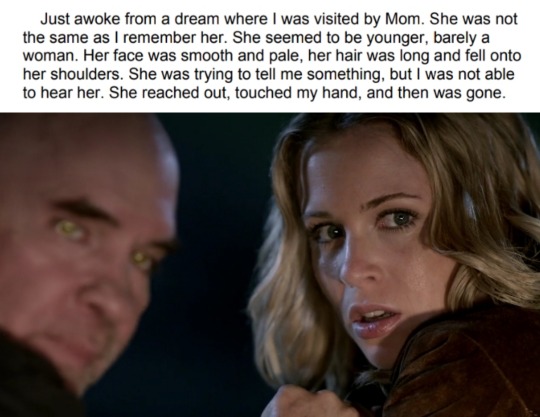


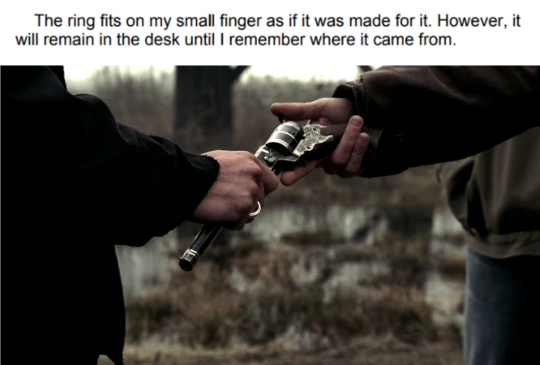
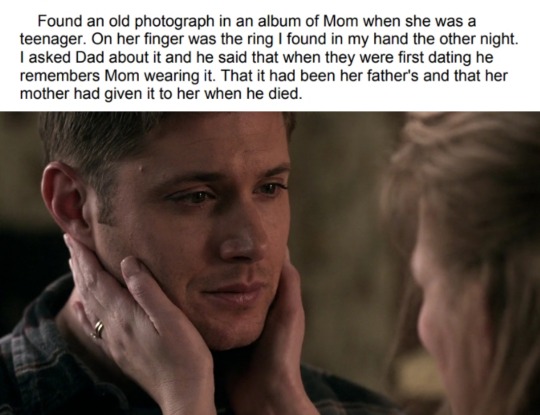
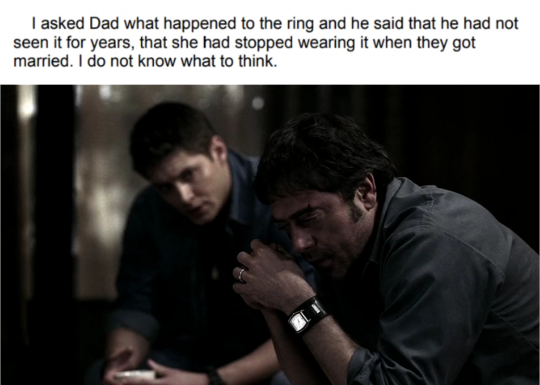
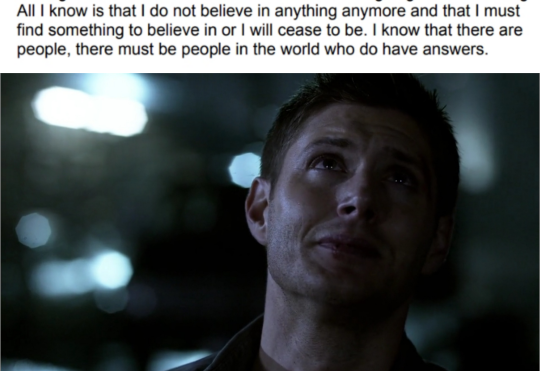


supernatural // the autobiography of fbi special agent dale cooper: my life, my tapes
44 notes
·
View notes
Text
We search and search, and always end up looking into the same mirror
I don’t know who I am. We search and search, and always end up looking into the same mirror, at the same reflection, hoping that we will find something different. Heal … heal … heal … heal … heal … heal … heal … heal … heal … heal … heal … heal … heal … heal … heal … please.
— Scott Frost, The Autobiography of F.B.I. Special Agent Dale Cooper: My Life, My Tapes (Pocket, May 1, 1991)
15 notes
·
View notes
Text
My ADHD riddled ass who hasn’t finished a real book since 5th grade somehow managed to sit down and read The Autobiography of Special Agent Dale Cooper: My Life In Tapes in its entirety yesterday and in my completion of it I’d like to share excerpts of the Sleep Experiment Cooper did on himself in College:
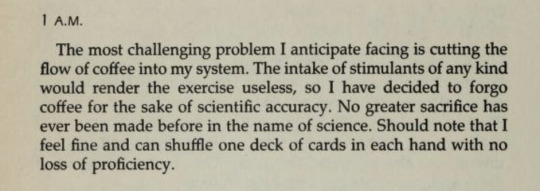




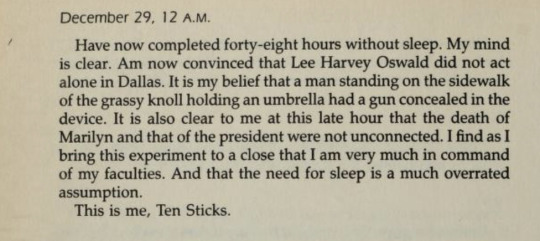
#twin peaks#Dale Cooper#The Autobiography of Special Agent Dale Cooper: My Life In Tapes#I somehow read an ENTIRE book yesterday#I spent the whole day sat down just READING#it was fucking insane#I read from ~2:20 to 10:14#I paused twice for short food breaks#but for the majority of that nearly 8 hour period I was READING A BOOK#y’all don’t realize how little I’ve actually read full books#I figured out I can finish a book if I just listen to it but even that doesn’t always work#actually the last time I finished a book was when I read upside down magic in 4th grade#this was like a 195 page book and I FINISHED IT#I’m so bad at finishing things I’m proud of myself
21 notes
·
View notes
Text
So, “Only The Wild Ones” has Prowl in it...
I’ve been re-reading “The Autobiography of FBI Special Agent Dale Cooper: My Life, My Tapes” for shiggles.
I actually can’t see Prowl as having ever been quite so idealistic as young Dale Cooper was, but I’m sure he was every bit as autistic. And just plain weird, which is not the same thing.
I am sure that Prowl is as gay as Cooper is straight.
I wonder if @breakdownsbuttlights has read this. I hope so, LMAO. That would be so excellent.
I am running with the notion that Agent Howlback is Prowl’s Diane, even though Prowl’s characterisation is in many respects quite different from Cooper’s. Mostly because “Only The Wild Ones” needs comic relief in places, and Howlback having to drop everything she’s doing to make Recordings of Prowl rapturously expounding upon the local cuisine, or other weird things he has noticed, is a whole lot of that. Certainly it will entertain Grimlock when she sits up in bed at 3:30 AM right out of a sound sleep to take distance recordings (once he realises that nobody’s recording what she’s experiencing).
(I had a crush on Cooper long ago, because of his personality. BB has made me thirst over Prowl...but it’s not because of his personality.)
That would make Agent Garboil Tumbler’s Diane-equivalent, which is also not without hilarity.
6 notes
·
View notes
Text
The Twin Peaks books
I have earlier talked at length about Twin Peaks, but only about the three seasons of the tv series and the theatrical movie. And that is not the whole story, for there have been several Twin Peaks tie-in books released over the years. And I think they are well worth checking out. So let’s talk about them, again spoilers apply. CW for a non-detailed discussion of rape.
The first to be released was The Secret Diary of Laura Palmer by Jennifer Lynch (daughter of David), which is exactly as it sounds. It is like all official Twin Peaks books, an epistolary book, purporting to be the secret diary Laura wrote, where she expressed the thoughts that she wanted to keep hidden, starting when she turned 12. It’s a rather dark read, as Laura was haunted and raped by BOB from a young age, and The Secret Diary is appropriately horrific.
Having this book be written by a woman was a very good decision. A lot of this novel expresses common pubertal angst and the struggle of becoming a woman in a very effective manner. And on top of that, it skilfully weaves this in with the supernatural aspects and the effect of sexual abuse on a child. Laura wonders if she is evil for having sexual thoughts, a common thought during puberty, and then this theme is intensified by having BOB reinforcing these thoughts in an attempt to possess her. The book understands the themes of Twin Peaks by having Bob represent patriarchal violence and pedophilia, and Laura’s story is about trying to resist that despite being a child. It’s a well-written but horrifying book that touches on similar themes and story to Fire Walk with Me. The movie ends up contradicting this book, but that doesn’t matter much.
The second book released was The Autobiography of F.B.I. Special Agent Dale Cooper: My Life, My Tapes, written by Scott Frost (brother of Mark Frost and who also wrote some scripts of the show). It’s another epistolary book, purporting to be the transcripts of the tapes Cooper has made, starting when he was about 13. The book’s tone is a lot lighter than The Secret Diary, with a lot of humour.
Yet there is still a dark parts, as Cooper experiences the loss of family and friends. The book seems to argue that Cooper’s white knight syndrome (meaning he is always trying to save women in distress) is grounded in the women in his life often dying. The book also heavily implies that both Cooper and his mother was haunted by BOB.
Still, there is less darkness compared to The secret diary, which means it’s less emotionally impactful, but it makes for a more entertaining read. Frost has a good handle on both Cooper’s voice and character. The depiction of Windom Earle and the Teresa Banks murder investigation was partially contradicted by the second season and Fire Walk With Me, but again it doesn’t matter. The depiction of both Laura and Cooper in these books is compelling enough that I do incorporate a lot of ideas from them into my personal headcanons.
After the cancellation of the series in 1991, the official books stopped being published. Yet when Twin Peaks was revived, Mark Frost himself decided to write two books surrounding the new season. The first of these two books was The Secret History of Twin Peaks, released in 2016 after the third season was written but before it was aired.
It’s yet again an epistolary novel, telling a very fragmentary history of Twin Peaks via a collection of a variety of fictional documents such as diary/journal excerpts, letters, newspaper clippings and US government reports, going from Lewis and Clark explorations of the Pacific Northwest to the end of the second season. Yet it goes beyond most epistolary novels in actually showing you scanned images of these fictional documents. It’s a really impressive book just visually, a sturdy hardcover, heavily illustrated with these images of the documents. The faked documents are really well-made and make the very act of reading visually interesting. It’s a book that I really recommend you get a proper physical copy of, the e-book edition is borderline unreadable by turning the documents into low-res images, at least on my e-reader. And I doubt even a good e-book edition would do the impressive graphic design justice.
The title The Secret History and it being written by Mark Frost may suggest it being some kind of definitive explanation, and I’ve read some reviews that took it as such, and condemned it for killing the mystery. But that is to severely misunderstand the book. It is clearly no objective or definitive history, for there is no omniscient objective third-person narrator in this book. Instead its epistolary format destabilizes any such reading. The bulk of the book is a dossier found in a bank vault by the FBI. The dossier collects a variety of documents to tell a fragmentary history of Twin Peaks and the paranormal phenomena that might be connected with it. The dossier was collected by a mysterious archivist who has typewritten additional narrative. The dossier is read and commented on by an FBI agent with the initials TP, who adds footnotes in the margins. This usually creates at least three narrative layers, in a nesting doll set-up, in a manner that reminds me of some Lovecraft stories.
Everything you read in the book is therefore all in-universe documents, written by characters with their own biases and viewpoints which sometimes disagree with each other, and you can’t take them as 100% reliable information on the Twin Peaks universe. There are moreover some minor but noticeable contradictions (like the situation with Norma’s mother) between the book and the tv series, something that was deliberate according to interviews with Mark Frost. Histories aren’t always accurate, and especially not newspaper reports or people’s letters or journals.
The book also liberally mixes real-life historical facts with fiction, which works to create a theme of uncertainty. The reader will probably question what in the book is true or fictional at several points. And that question raises uncertainty with any information about the world of Twin Peaks as well. The book therefore stays true to the show’s mysterious and surreal nature.
So no, this is not some kind of definitive explanation that solves the mystery of Twin Peaks. Any explanation of the mysteries of the franchise you find here is literally often just a character’s interpretation. The fact that the epistolary format is used for all the official Twin Peaks books over a period of almost 30 years is maybe a deliberate choice. It might be the only way to stay true to the series’s theme of subjectivity, with a dream vision being as important as consensus reality. The books add to the fan’s understanding of the series, but they are ultimately just the point of view of the characters and there are contradictions between them and the series, thus not making any of them into a definitive explanation.
It’s ultimately an appropriately humble book. It is not a co-creator trying to lecture to the audience what his work really means, and that is good. I took it as a story, or rather a series of stories about the world of Twin Peaks. Yet this becoming humility doesn’t mean the book isn’t an impressive achievement, one which expands on the themes of the tv series.
The mixing of fact and fiction is really well-done, and Frost displays a considerable amount of knowledge. The verisimilitude of the documents is aided both by the graphic design and how the writing makes a convincing pastiche of whatever medium and idiom that each document is supposed to represent.
I noticed a lot of reviewers were put-off by the lengthy use of UFO mythology, connecting it closely to the mythology of the show, dismissing it as cliché. But Twin Peaks was always an exploration of well-worn pop culture tropes and I found how this book handled the UFOs rather fun.
And if Frost’s use of UFO mythology, like the men in black, the greys, the nordics and so on, might ever seem cosily familiar, the book ultimately turns them into effective cosmic horror. Near the end of the book, we get a suggestion what the lodge beings (the biggest mystery of the show) and the UFOs might be. They are basically ancient inhuman beings, reminscient of Lovecraft’s creations and John Keel’s ultraterrestials. And it’s just a suggestion, literally just a character’s own theory. They even explicitly says that their theory is not a proper explanation, as they believe the lodge creatures being ultimately beyond human understanding in proper cosmic horror fashion.
The book is about more than cosmic horror. Frost uses the fictional history of Twin Peaks and the paranormal and conspiracy theories to give his critical view of American history. Twin Peaks has always been about the darkness beneath what seems to be an idyllic American small-town, and a “secret history” is a good way to depict that. The book’s epistolary format shows how there are multiple views on history, and accordingly the book gives an alternate reading of US history that is different from the standard self-serving one.
The book builds on the themes of the show, where Hawk, who is native American, is one of the few that seems to have an understanding of the white and black lodges. And the evil of the black lodge seem to respond and be strengthened by human violence and environmental destruction (such as how BOB is shown to come into our world with the Trinity nuclear test).
So the book uses the real bloody history of the American colonization of the Pacific Northwest area, how the Nez Perce tribe was ethnically cleansed from the area and placed on a reservation to make room for white settlers. And it was only from this real life bloody history that the white American small town of Twin Peaks can be created.
Being created from this violent act, Twin Peaks continues to show some of the worst aspects of American capitalism as its history develops. The corruption of the town’s leading class we already see in the series is shown to have generations-deep roots. The towns logging industry comes to be monopolized by the Packard family via shady dealings, and the Horne family’s rise to power is similar. The Packard family ultimately cuts down all the old-growth forests, only to then literally burn down the saw mill as depicted in Season 1 of the show to make a profit, destroying the livelihood of much of the town.
The Nez Perce knew and treated the Lodges with respect, the white people don’t and end up feeding it. All this violence, hierarchy and environmental destruction seems to feed the Black Lodge, leading to the malaise that infects and destroys the Palmer family which is the starting point of the show.
The Secret History is a very good and fascinating book. Alone as a physical and visual object, it impresses. And the care, skill and erudition with which Mark Frost wrote it is truly impressive.
It’s very much worth reading for fans of the series.
Mark Frost followed up this book with Twin Peaks: The Final Dossier, which was released in 2017 after the third season had aired. This is a much less complex and shorter book than The Secret History, being less than 150 pages and abandoning the more complex three-layered narrative of its predecessor.
Instead there is just one single narrative layer, of FBI agent Tamara Preston writing a dossier on the inhabitants of Twin Peaks and events related to them, shortly after experiencing the events of the third season.
It’s also more of less entirely focused on characters from the show, whereas The Secret History went farther afield. It’s a lot more what you expect from a tie-in book, mostly explaining the fate of characters during the 25 year timeskip.
It’s not a bad book, just a lesser one compared to the titanic The Secret History. I treated it as a short epilogue to both The Secret History and season 3, and as such it more than satisfies. It fills in some gaps in the narrative, and updates us on the fates of the characters. Yet Frost wisely leaves the major mysteries of season 3 unexplained, such as what is Audrey’s situation and what happened in Part 18? We learn that Cooper’s time travelling in Part 17 did indeed change history, but not much more. These books have been accused of explaining far too much, but it’s a very unfair accusation, as Frost knows better than to clear up the central mysteries.
All four of these books are ultimately just for fans of the series, which can stand without them. Yet what a treat they are for the fans. The Secret Diary and My Life, My Tapes give us convincing depiction of the inner lives of Laura Palmer and Cooper. And The Secret History is an impressive achievement that expands upon the world and themes of Twin Peaks in a wonderful fashion. And The Final Dossier is a nice little coda to The Secret History and Season 3.
4 notes
·
View notes
Note
9, 12, 14!
9. Did you get into any new genres?
I took a seminar centring on graphic memoirs so I read a lot of graphic novels
12. Any books that disappointed you?
salt slow by Julie Armfield :/
14. What books do you want to finish before the year is over?
The Secret Talker by Geling Yan
An Invitation from a Crab by Panpanya
The Autobiography of F.B.I. Special Agent Dale Cooper: My Life, My Tapes by Scott Frost
Lonely Castle in the Mirror by Mizuki Tsujimura
Trying to hit my reading goal of 100 books this year
1 note
·
View note
Text
Diane, I would like very much right now not to be a law enforcement officer. I would like to be in a high meadow in the Himalayas, living only for and within the moment.
the autobiography of fbi special agent dale cooper: my tapes, my life as heard by scott frost
5 notes
·
View notes
Text

The Autobiography of FBI Special Agent Dale Cooper: My Life, My Tapes
has been out of print for decades, so many Twin Peaks Fans have been out of luck trying to read it, if they even know it exists in the first place.
But if you’re a listener of audio podcasts, you’re in luck 🎧 i put all my complicated feelings into a monster-sized episode and I think by the end of it, you’ll have a pretty good idea (especially if you glance through the timestamped topics in the show notes for all six hours) if you’re going to want to track down this little-discussed gem or leave its ideas about the early days of Dale Cooper in the dust.
Full disclosure: I’m historically not the biggest fan of this book. It shows us a Cooper that doesn’t always match with Kyle MacLachlan’s super-charming performance.
But also full disclosure: after the 2017 edition of Twin Peaks, I’ve softened a lot on this book. For a tie-in book that was published DURING the show’s run, this book was brave for not treating its paragon hero always like a paragon or hero, but more like a flawed human. If you handle that thought okay, this book may just be of value to you.
Have you read it already?
#twin peaks#special agent dale cooper#podcast#kyle maclachlan#booklr#cult tv#more coffee#character assassination#big chungus#the owls are not what they seem#Spotify
1 note
·
View note
Text



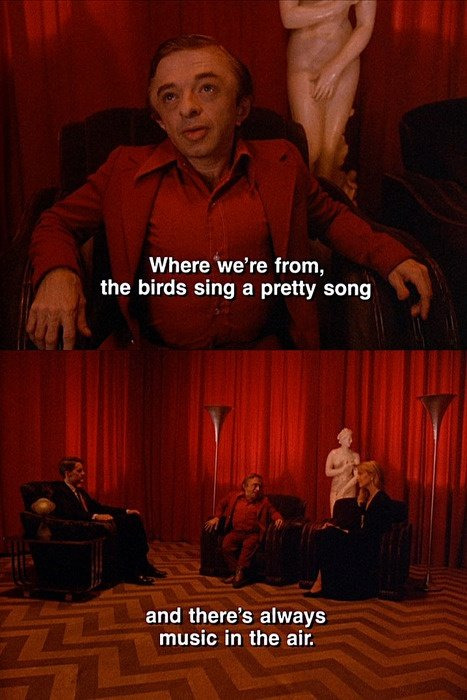
The House of Dust: A Symphony (1920) by Conrad Aiken
The Autobiography of F.B.I. Special Agent Dale Cooper: My Life, My Tapes by Scott Frost (1991)
Blue Velvet (1986) Dir. David Lynch
Twin Peaks (1990-1991) Mark Frost & David Lynch
#collage#american poetry#twin peaks#blue velvet 1986#david lynch#special agent dale cooper#my life my tapes
46 notes
·
View notes
Text
2022
key
↻ = re-read
☞ = continuing (started previously)
✑ = for school
➢ = reading to ellum
✏︎ = from the library
☏ = others recommended and/or gifted to me
- measuring eternity: the search for the beginning of time by martin gorst
- the holy bible (the revised standard version)
- stiff: the curious lives of human cadavers by mary roach
- the primeval atom: an essay on cosmogony by canon georges lemaître, trans. betty h. and serge a. koroff
- ✑ the land ethic by aldo leopold
- cyrano de bergerac by edmond rostand, trans. gladys thomas and mary f. guillemard
- ↻ cyrano de bergerac by edmond rostand, trans. brian hooker
- quantum leap: the novel by ashley mcconnell
- deadeye dick by kurt vonnegut
- the bean trees by barbara kingsolver
- colossus by d. f. jones
- war with the newts by karel čapek
- ☏ animal dreams by barbara kingsolver
- voices from chernobyl by svetlana alexievich, trans. keith gessen
- love like water, love like fire by mikhail iossel
- cod: a biography of the fish that changed the world by mark kurlansky
- the lathe of heaven by ursula k. le guin
- ☞ special topics in calamity physics by marisha pessl
- winter count by barry holstun lopez
- galápagos by kurt vonnegut
- the house of the seven gables by nathaniel hawthorne
- the year of magical thinking by joan didion
- ✑ modern architecture since 1900 by william j. r. curtis
- ✑ introduction to recreation services: sustainability for a changing world by
karla a. henderson
- ☏ the member of the wedding by carson mccullers
- giovanni's room by james baldwin
- the autobiography of f.b.i. special agent dale cooper: my life, my tapes by scott frost
- the making of the atomic bomb by richard rhodes
- too close for comfort by ashley mcconnell
- isaac newton by james gleick
- the myth of sisyphus by albert camus
- the cosmic connection: an extraterrestrial perspective by carl sagan
- starfleet academy by mike johnson and ryan parrott
- time, love, memory: a great biologist and his quest for the origins of behavior by jonathan weiner
- alaska bear tales by larry kaniut
- the glass menagerie by tennessee williams
- ☞ waiting for godot by samuel beckett
- ☏ the tin drum by günter wilhelms grass
- ☞ nine stories by j. d. salinger
- from both sides now: the poetry of the vietnam war and its aftermath, edited by phillip mahony
- brave new world by aldous huxley
- ➢ stuart little by e. b. white
- ➢ the lion, the witch, and the wardrobe by c. s. lewis
- uncle tungsten: memories of a chemical boyhood by oliver sacks
- hope: entertainer of the century by richard zoglin
- my brief history by stephen hawking
- ☞ solar perplexus by dean young
- the omnivore's dilemma by michael pollan
- ☞ log three by alan dean foster
- the last thing he wanted by joan didion
- still foolin’ em’ by billy crystal
- kitchen confidential: adventures in the culinary underbelly by anthony bourdain
- broken bow by diane carey
- ☞ for the relief of unbearable urges by nathan englander
- star trek: the motion picture: a novel by gene roddenberry
- my incredibly wonderful, miserable life by adam nimoy
- i am not spock by leonard nimoy
- gentleman: the william powell story by charles francisco
- myrna loy: being and becoming by myrna loy and james kotsilibas-davis
- joy of cooking (6th edition, december 1986) by irma s. rombauer and marion rombauer
- pulitzer: a life in politics, print, and power by james mcgrath morris
- the sea by john banville
- the all-new, all-purpose joy of cooking (7th edition, january 1997) by irma s. rombauer, marion rombauer, and ethan becker
- ✏︎ the anatomist: a true story of gray’s anatomy by bill hayes
- ✏︎ natural history by carlos fonseca, trans. megan mcdowell
- ✏︎ the lamb's war by jan de hartog
- ✑ evolution (second edition) by carl t. bergstrom and lee alan dugatkin
- ✑ your inner fish: a journey into the 3.5-billion-year history of the human body by neil shubin
- ✑ interactive general chemistry by jessica white, brian anderson, brandon green, and mildred hall
- ✑ ecology (eighth edition) by manuel c. molles jr. and anna sher simon
- ✏︎ the sirens of mars: searching for life on another world by sarah stewart johnson
- ↻ the man who mistook his wife for a hat and other clinical tales by oliver sacks
- letters to véra by vladimir nabokov, trans. olga voronina and brian boyd
- ✏︎ the history of tom jones: a foundling by henry fielding, illustrated by t. m. cleland
- cactus hotel by brenda z. guiberson, illustrated by megan lloyd
- ✏︎ tinkers by paul harding
- ✏︎ the life and death of peter sellers by roger lewis
- ✏︎ swamplands: tundra beavers, quaking bogs, and the improbable world of peat by edward struzik
- ✏︎ far from the madding crowd by thomas hardy
- a short history of nearly everything by bill bryson
- the swamp: the everglades, florida, and the politics of paradise by michael grunwald
- life signs: the biology of star trek by susan and robert jenkins
- ✏︎ dinner with dimaggio: memories of an american hero by dr. rock positano and john positano
- ☏ displacement by kiku hughes
- reverence for life: an anthology of selected writings by albert schweitzer, edited by thomas kiernan
- dean & me: a love story by jerry lewis and james kaplan
- steps in time: an autobiography by fred astaire
- seven brief lessons on physics by carlo rovelli, trans. simon carnell and erica segre
- behaving as if the god in all life mattered: a new age ecology by machaelle small wright
- ✏︎ leonard cohen: the mystical roots of genius by harry freedman
- ✏︎ baggage: tales from a fully packed life by alan cumming
- ✏︎ paul simon: the life by robert hilburn
- ☞ masters of sex: the life and times of william masters and virginia johnson, the couple who taught america how to love by thomas maier
- ✏︎ the flame: poems, notebooks, lyrics, drawings by leonard cohen, edited by robert faggen and alexandra pleshoyano
- ✏︎ book of longing by leonard cohen
- ✏︎ stranger music: selected poems and songs by leonard cohen
- ☏ the beginning place by ursula k. le guin
- selected poems by octavio paz, trans. g. aroul, elizabeth bishop, paul blackburn, lysander kemp, denise levertov, muriel rukeyser, mark strand, charles tomlinson, william carlos williams, monique fong wust, and the editor (eliot weinberger)
- averno by louise glück
- dance for two: selected essays by alan lightman
- ✏︎ dostoevsky: a writer in his time by joseph frank
- from sawdust to stardust: the biography of deforest kelley, star trek's dr. mccoy by terry lee rioux
- ☏ the dead romantics by ashley poston
- ✑ experimental writing: a guide and anthology by will cordiero and lawrence lenhart
- ☏ lessons in chemistry: a novel by bonnie garmus
- ✏︎ eels: an exploration, from new zealand to the sargasso, of the world’s most mysterious fish by james prosek
9 notes
·
View notes